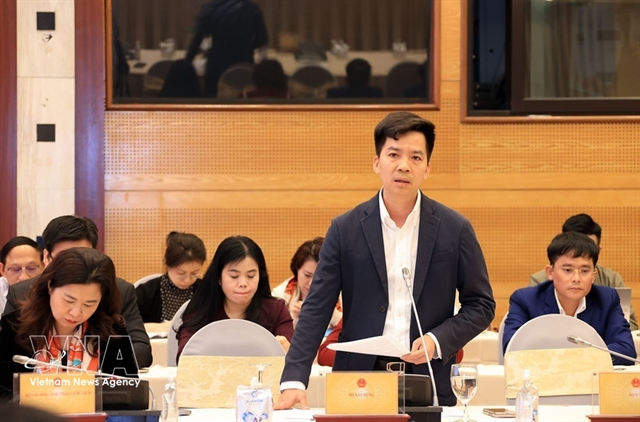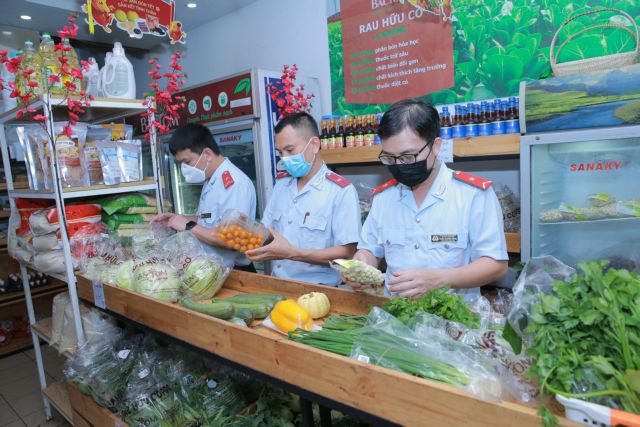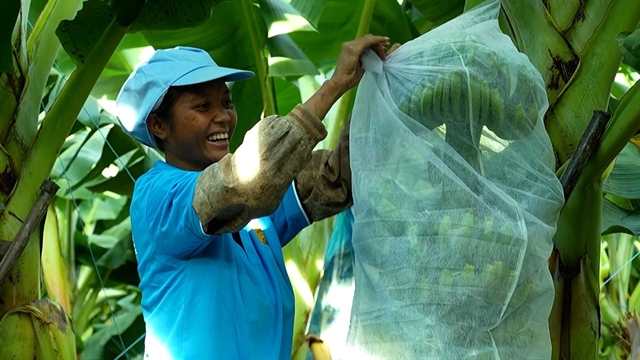 Society
Society

 |
| Inspectors check the food safety and traceability of organic farming products at a store in Hà Nội. Photo The courtesy of Hà Nội Agriculture and Rural Development Department |
HÀ NỘI -- Hà Nội authorities have been taking measures to promote the traceability of agricultural products as a way to meet consumer demand for clean, safe food.
From the beginning of this year, the Hà Nội Department of Agriculture and Rural Development has signed cooperation agreements with 28 provinces and cities across the country to ensure food safety and improve the quality and value chain supply of agricultural, forestry and fishery products.
The city has continued to build, maintain and develop 159 food safety linkages from production to consumption, including 47 animal product chains, six aquatic product chains, and 106 plant origin product chains, an increase of 18 chains over the same period last year.
The chains have attracted many businesses, co-operatives and farming households to participate, providing thousands of tonnes of clean agricultural products to consumers in the capital.
Nguyễn Thị Thu Hằng, Director of the city's Agricultural, Forestry and Fisheries Quality Management Sub-Department, said that currently, the city's agriculture industry was developing a system of traceability for agricultural, forestry and fishery products food via the site check.hanoi.gov.vn.
More than 3,100 food producing/processing/packing and trading establishments were given accounts to log in and update data to the system.
"A total of 10,952 sets of traceability codes were granted to agricultural, forestry and fishery products that meet food safety criteria," Hằng said.
"The traceability system will help prevent unknown origin food from being sold in the market. Thereby, food producers and distributors must strictly comply with growing, harvesting, preserving and transporting food regulations."
Hằng said that from the beginning of this year, the Agricultural, Forestry and Fisheries Quality Management Sub-Department coordinated with other agencies to inspect 55 agricultural, forestry and fishery production facilities.
However, it was still difficult to control the quality of food on the market because agricultural production in provinces and cities was still small and fragmented, Hằng said.
"Agricultural products are mainly consumed through traditional methods such as wholesale markets and wet markets where consumers usually pay little attention to the origin of products," she said.
To raise people's awareness of agricultural, forestry and fishery production and business, it was necessary to form safe agricultural production areas, and create favourable conditions for product traceability, said Vice Chairman of Ứng Hòa District People's Committee Ngô Tiến Hoàng.
Ứng Hòa District was now forming a concentrated area of rice and fruit trees, expecting high-quality rice to account for 60-70 per cent of rice cultivation.
The district also focused on growing vegetables and fruits of high value and forming a safe aquaculture area, Hoàng said.
Director of Hà Nội Department of Agriculture and Rural Development Chu Phú Mỹ said that to control the origin of agricultural products and food on the market, the city continued to coordinate with localities to expand concentrated production associated with a high-tech applications, organic agriculture and advanced quality management system.
The city's agricultural sector would deepen cooperation with provinces and towns to develop safe production and supply chains of agricultural, forestry and aquatic products, Mỹ said.
Authorities would take samples to monitor agricultural, forestry and fishery products in widespread distribution.
Mỹ said that unscheduled inspections were needed to timely handle food quality and safety violations in the market.
With a traceability system for agricultural products, Hà Nội expected to complete and connect its traceability system with the national one by 2025, Mỹ said.
Agriculture agencies would continue to propose to the municipal authority mechanism to support establishments trading in safe agricultural, forestry and fishery products with access to the system.
Localities were called to support businesses in completing procedures for registering codes, barcodes, and QR codes that facilitate the traceability of farm products. VNS




